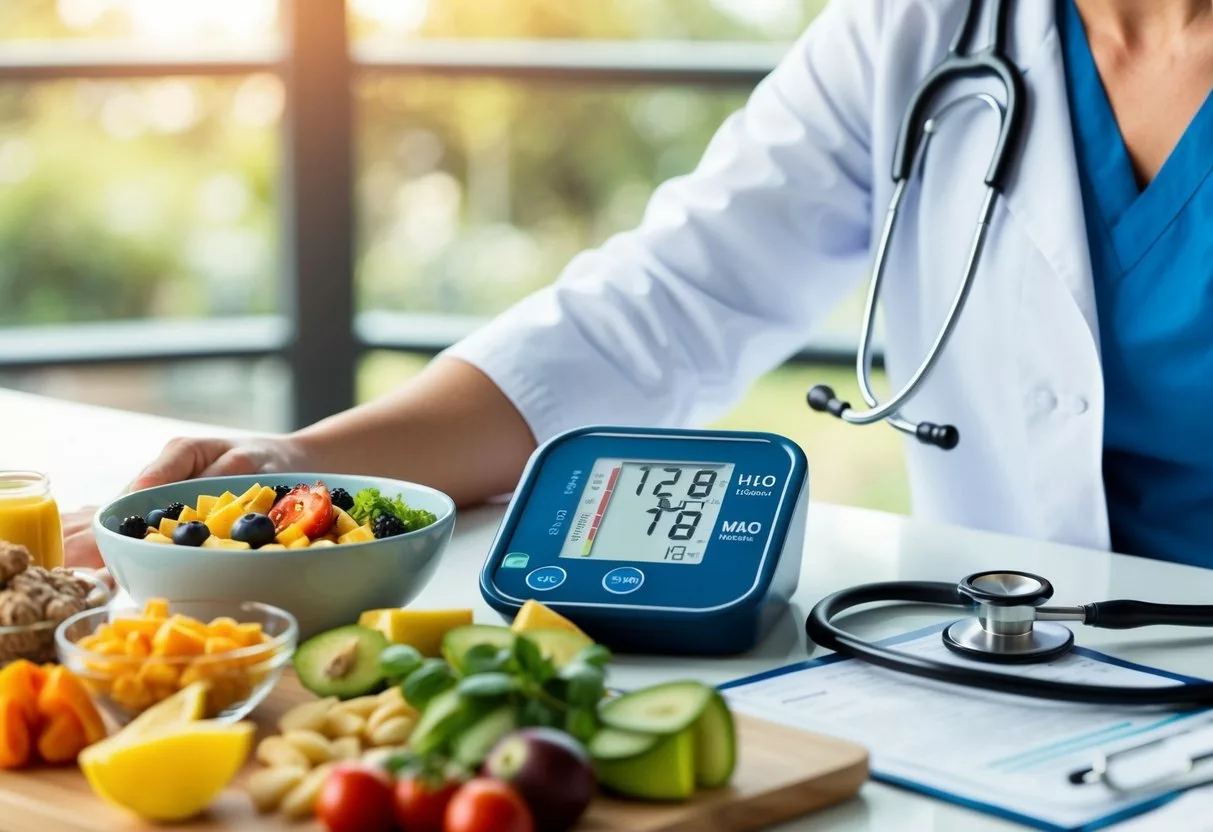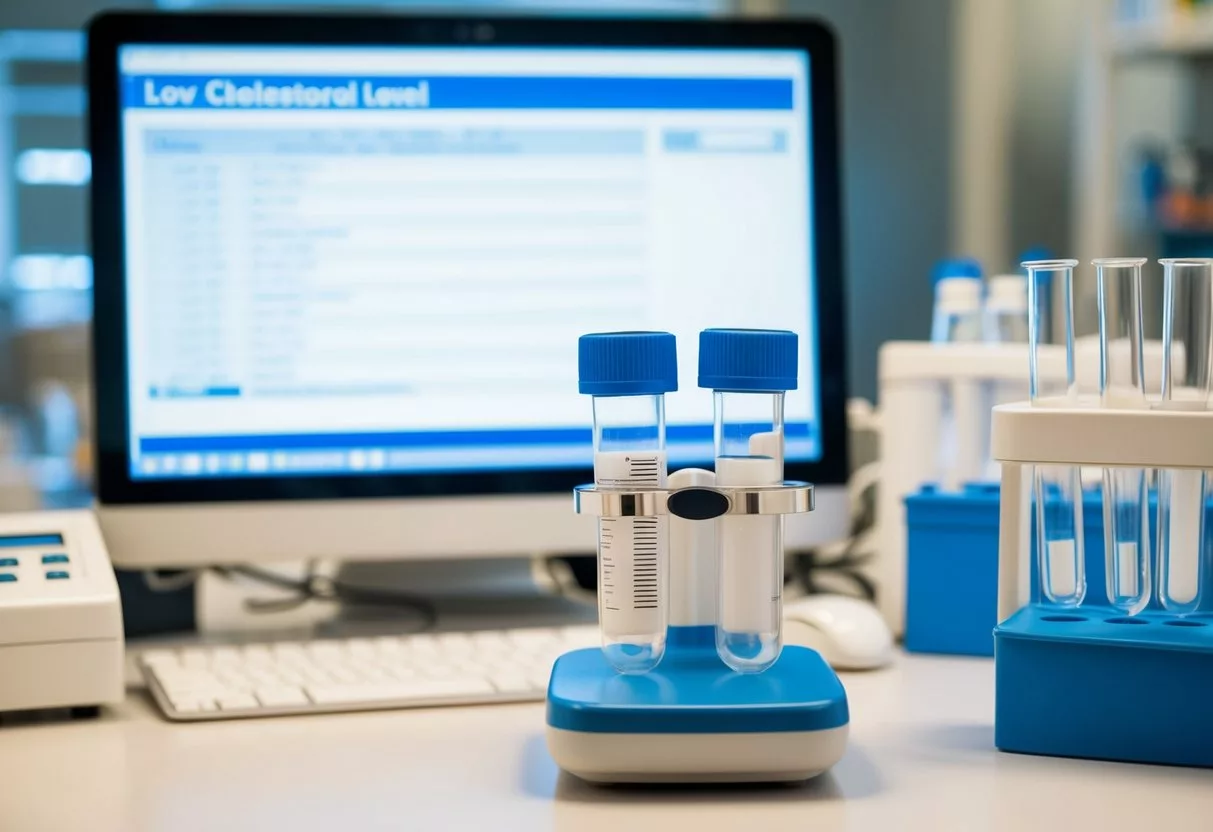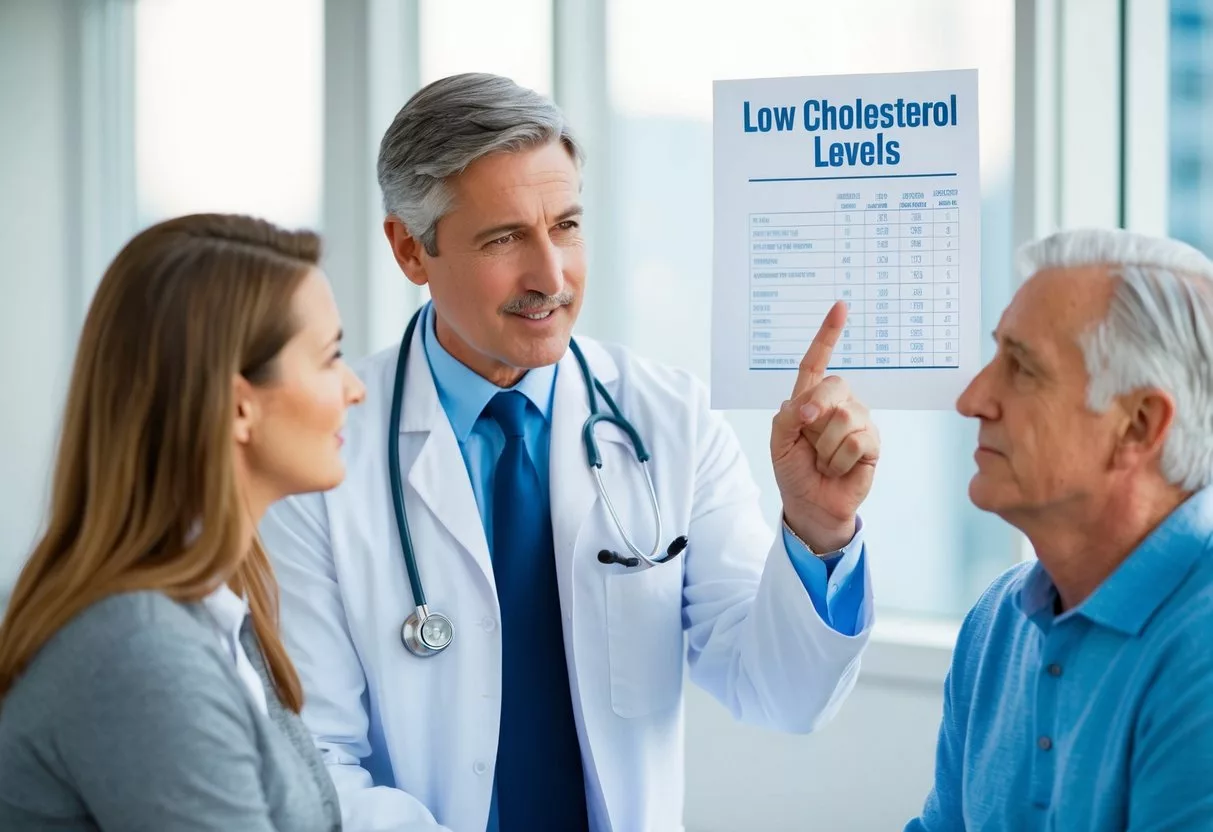Cholesterol is often seen as a health villain, but it’s an essential substance for our bodies. While high cholesterol can be harmful, having levels that are too low can also cause problems. Very low cholesterol levels may lead to health issues like anemia, increased cancer risk, and a higher chance of stroke.

Low cholesterol is less common than high cholesterol, but it’s still important to be aware of. LDL cholesterol below 40 mg/dL is typically considered too low. This can affect the body’s ability to produce hormones, digest fats, and maintain cell membranes.
Some people naturally have lower cholesterol levels, while others may experience a drop due to medications or certain health conditions. It’s crucial to maintain a balance and work with a healthcare provider to monitor and manage cholesterol levels effectively.
Key Takeaways
- Cholesterol is vital for bodily functions, and levels that are too low can be harmful
- Very low cholesterol may increase risks of certain health issues
- Regular monitoring and professional guidance are important for maintaining healthy cholesterol levels
Understanding Cholesterol

Cholesterol plays a key role in our bodies. It helps make cell membranes and hormones. There are different types of cholesterol, and each has its own function.
The Role of Cholesterol in the Body
Cholesterol is a waxy substance found in every cell. It helps build cell walls and make important hormones. The liver makes most of the cholesterol in our bodies. We also get some from foods like eggs and meat.
Cholesterol travels through the blood in tiny packages called lipoproteins. These packages carry cholesterol to where it’s needed in the body. Without cholesterol, our bodies couldn’t work right.
Some key functions of cholesterol include:
- Making vitamin D
- Producing bile for digestion
- Forming memories in the brain
Categories of Cholesterol: LDL, HDL, and Triglycerides
There are three main types of cholesterol:
- LDL (Low-Density Lipoprotein): Often called “bad” cholesterol. It can build up in arteries and cause heart problems.
- HDL (High-Density Lipoprotein): Known as “good” cholesterol. It helps remove other forms of cholesterol from the bloodstream.
- Triglycerides: A type of fat in the blood. High levels can raise the risk of heart disease.
Total cholesterol is the sum of LDL, HDL, and 20% of triglycerides. Doctors look at all these numbers to judge overall heart health.
Optimal Cholesterol Levels
Healthy cholesterol levels vary by age and gender. The American Heart Association and American College of Cardiology give these guidelines:
- Total cholesterol: Less than 200 mg/dL
- LDL cholesterol: Less than 100 mg/dL
- HDL cholesterol: 40 mg/dL or higher for men, 50 mg/dL or higher for women
- Triglycerides: Less than 150 mg/dL
These numbers are just a guide. Some people may need different targets based on their health. It’s best to talk with a doctor about personal cholesterol goals.
Regular blood tests can check cholesterol levels. This helps catch problems early. Lifestyle changes and medicine can help manage high cholesterol.
The Risks of Low Cholesterol
While high cholesterol gets a lot of attention, having cholesterol levels that are too low can also be harmful. Low cholesterol, known as hypocholesterolemia, can lead to various health issues affecting both physical and mental wellbeing.
Physical Health Implications
Very low cholesterol levels may increase the risk of certain health problems. People with hypocholesterolemia might experience weakness, fatigue, and difficulty fighting infections. Low cholesterol has been linked to a higher chance of hemorrhagic stroke, where blood vessels in the brain burst.
Some studies suggest a connection between low cholesterol and cancer risk, though more research is needed to confirm this link. Extremely low levels may also affect hormone production, as cholesterol is a building block for many hormones in the body.
Impact on Mental Health
Low cholesterol levels can affect brain function and mental health. Some research indicates a possible link between very low cholesterol and increased rates of depression and anxiety. The brain needs cholesterol to function properly, and insufficient levels might disrupt neurotransmitter activity.
There’s also evidence suggesting a connection between low cholesterol and aggressive behavior or impulsivity in some individuals. However, it’s important to note that the relationship between cholesterol levels and mental health is complex and not fully understood.
Associations with Chronic and Genetic Conditions
Certain chronic diseases and genetic conditions can cause or be associated with low cholesterol. Liver disease may lead to reduced cholesterol production. Malnutrition and malabsorption disorders can also result in low cholesterol levels.
Genetic conditions like familial hypobetalipoproteinemia and abetalipoproteinemia can cause extremely low cholesterol. These rare disorders affect the body’s ability to produce or transport lipoproteins. People with these conditions may experience neurological problems, vision issues, and difficulty absorbing fat-soluble vitamins.
Some chronic infections, such as hepatitis C, can also lead to lower cholesterol levels. It’s crucial for individuals with persistently low cholesterol to work with healthcare providers to identify underlying causes and manage potential health risks.
Identifying Low Cholesterol

Low cholesterol can be tricky to spot. It often doesn’t cause obvious symptoms. But doctors can find it through blood tests and by looking for certain signs.
Signs and Symptoms
Extremely low LDL cholesterol may lead to some health issues. These can include:
• Fatigue
• Dizziness
• Weakness
• Mood changes
Some people might get anemia. This means they don’t have enough healthy red blood cells. It can make them feel very tired.
Not everyone with low cholesterol will have these problems. Many people feel fine. That’s why regular check-ups are important.
Diagnostic Tests
A blood test is the main way to check cholesterol levels. Doctors look at different types of cholesterol:
• Total cholesterol
• LDL (bad) cholesterol
• HDL (good) cholesterol
• Triglycerides
They compare these numbers to normal ranges. Low total cholesterol is usually below 140 mg/dL. LDL below 40 mg/dL might be too low.
Doctors may also check for other health issues. This helps them understand why cholesterol is low. They might look at liver function, thyroid levels, and nutrition status.
Causes of Low Cholesterol
Low cholesterol levels can result from various factors. These include lifestyle choices, medical treatments, and certain health conditions. Understanding these causes is important for maintaining proper cholesterol balance.
Lifestyle Factors
Diet plays a key role in cholesterol levels. A healthy diet low in saturated fats can lower cholesterol. In some cases, this may lead to levels that are too low. Regular exercise can also reduce cholesterol.
Smoking is another factor. It can lower HDL (good) cholesterol, which may result in an unhealthy balance.
Some people naturally produce less cholesterol. This can be due to genetic factors.
Medical Interventions
Medications are a common cause of low cholesterol. Statins are often prescribed to lower high cholesterol. In some cases, they may work too well.
Other cholesterol-lowering drugs include:
- PCSK9 inhibitors
- Bile acid sequestrants
- Fibrates
These medications can effectively reduce cholesterol levels. Sometimes, they may cause levels to drop too low.
Hormonal and Metabolic Disorders
Several health conditions can lead to low cholesterol:
- Hyperthyroidism: An overactive thyroid can speed up metabolism and lower cholesterol.
- Liver dysfunction: The liver produces cholesterol. If it’s not working properly, cholesterol levels may drop.
- Malabsorption: This condition prevents proper nutrient absorption, including cholesterol.
Chronic infections like hepatitis C can also cause low cholesterol. The body uses cholesterol to fight infections, which can deplete levels.
Hormonal imbalances, particularly low testosterone in men, may result in decreased cholesterol production.
Managing Low Cholesterol

Low cholesterol can be addressed through diet, lifestyle changes, supplements, and medication adjustments. Regular monitoring is key to maintaining healthy levels.
Dietary Recommendations
A heart-healthy diet is crucial for managing cholesterol levels. People with low cholesterol should focus on consuming foods that can help raise HDL (good) cholesterol. These include:
- Healthy fats: olive oil, avocados, nuts
- Omega-3 rich foods: fatty fish, flaxseeds, chia seeds
- Whole grains: oats, quinoa, brown rice
- Lean proteins: chicken, turkey, legumes
It’s important to limit processed foods and excessive sugar intake. Eating smaller, more frequent meals can help stabilize cholesterol levels throughout the day.
Lifestyle Considerations
Exercise plays a vital role in managing cholesterol. Aim for at least 30 minutes of moderate activity most days of the week. This can include:
- Brisk walking
- Swimming
- Cycling
- Strength training
Stress management is also crucial. High stress levels can affect hormone production, which may impact cholesterol levels. Techniques like meditation, yoga, or deep breathing exercises can help reduce stress.
Smoking cessation is essential for heart health and can positively influence cholesterol levels. Quitting smoking can improve HDL cholesterol levels and overall cardiovascular health.
Supplementation and Medication Adjustments
Some supplements may help raise cholesterol levels:
- Niacin (Vitamin B3)
- Omega-3 fatty acids
- Vitamin D
It’s crucial to consult a healthcare provider before starting any supplements. They can recommend appropriate dosages and monitor for potential side effects.
For those on cholesterol-lowering medications, such as statins, dosage adjustments may be necessary. A doctor can evaluate the need for medication changes based on individual health status and cholesterol levels.
Regular Monitoring
Consistent blood tests are essential to track cholesterol levels. The frequency of testing depends on individual risk factors and health status. Typically, doctors recommend checking cholesterol levels every 4-6 months for those managing low cholesterol.
During check-ups, healthcare providers will assess:
- Total cholesterol
- LDL (bad) cholesterol
- HDL (good) cholesterol
- Triglycerides
They may also evaluate other health markers to ensure overall well-being. Regular monitoring helps detect any changes early and allows for timely adjustments to the management plan.
Potential Complications from Extremely Low Cholesterol
Very low cholesterol levels can lead to several health issues. These range from increased cancer risk to problems with development and reproduction. Cardiovascular health may also be affected in unexpected ways.
Increased Risk of Cancer
Low cholesterol levels may be linked to a higher cancer risk. Some studies have found a connection between extremely low LDL cholesterol and certain types of cancer.
This doesn’t mean low cholesterol causes cancer. The relationship is complex and not fully understood. Scientists are still researching why this link exists.
People with very low cholesterol should be aware of this potential risk. Regular cancer screenings may be important for those with consistently low cholesterol levels.
Developmental and Reproductive Issues
Extremely low cholesterol can affect hormone production. This can lead to problems with development and reproduction.
In women, low cholesterol may cause:
- Irregular menstrual cycles
- Fertility issues
- Higher risk of premature birth
Men might experience:
- Reduced testosterone levels
- Lower libido
- Decreased energy
Pregnant women with very low cholesterol may have a higher chance of delivering babies with low birth weight.
Cardiovascular Concerns
While high cholesterol is often linked to heart problems, extremely low levels can also cause issues. These may include:
- Increased risk of stroke
- Changes in heart function
- Possible impact on atherosclerosis progression
Some research suggests very low LDL cholesterol might affect cell membrane structure and function. This could potentially influence cardiovascular health in ways that aren’t yet fully clear.
Doctors continue to debate the long-term effects of very low cholesterol on heart health. More research is needed to understand these impacts fully.
Frequently Asked Questions

Low cholesterol can cause health issues. People may experience symptoms, and it can be linked to other conditions. Knowing the signs and treatment options is important.
What are the potential symptoms of having low cholesterol?
Low cholesterol may cause weakness or fatigue. Some people feel dizzy or have trouble concentrating. Memory problems can also occur.
Mood changes like depression are possible. Digestive issues may happen too.
Can low cholesterol levels be indicative of underlying cancer?
Some cancers can cause low cholesterol. This happens as the body uses up cholesterol to make new cells. Low levels don’t always mean cancer, but doctors may check for it.
At what point is a cholesterol level considered dangerously low?
Total cholesterol below 125 mg/dL is very low. HDL cholesterol under 40 mg/dL can be a concern. LDL levels below 60 mg/dL may be too low for some people.
Doctors look at all numbers together. What’s too low varies for each person.
How should one approach treatment if diagnosed with low cholesterol levels?
Treatment depends on the cause. If medications are lowering cholesterol too much, doctors may adjust the dose. Eating more healthy fats can help raise levels.
Treating underlying conditions is key. This may include hormone therapy or addressing malnutrition.
Are there any side effects associated with extremely low cholesterol?
Very low cholesterol can affect hormone production. This may lead to fertility issues. It can also impact brain function and mental health.
Low cholesterol might increase the risk of hemorrhagic stroke. The body needs some cholesterol to work properly.
Could low cholesterol contribute to feelings of fatigue?
Fatigue is a common symptom of low cholesterol. The body uses cholesterol to make hormones that affect energy levels. Low levels can disrupt this process.
People with low cholesterol often feel tired or weak. This can impact daily activities and quality of life.